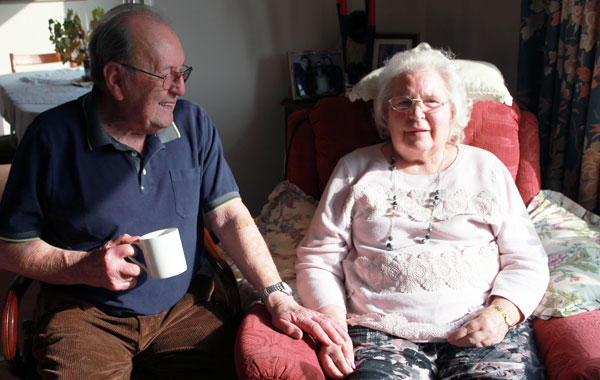Independent living with a micro-provider for end-of life care

About Tom and Eileen
Tom and Eileen are in their late 80s. They live in their own bungalow in a village in Somerset. They are supported by a micro-provider support worker. sEileen ha
When Debby (a micro-provider support worker) spends a full day with Tom and Eileen, Tom can go out without hurrying or worrying about Eileen. Debby can prepare support ahead of time, such as laundry or meals. Tom and Eileen are able to continue to live together in their own home, despite Eileen’s health issues. Tom is able to continue to run his business and play an active role in caring for Eileen.
Debby’s business background provides administrative support for Tom’s business and she and Tom work as a team supporting Eileen to move around and keep mobile.
Eileen has Parkinson’s and advanced dementia. Three years ago, she had a series of mini-strokes and is now unable to walk, so they have hoists fitted in their lounge, bedroom and bathroom. Eileen and Tom receive support from Debby, a micro care provider supported by Community Catalysts CIC, and a separate care agency. Tom paid privately for all of this until January 2017 when the council provided some funding as ‘End of Life’ care. Tom still pays privately for some of Debby’s time.
Tom and Eileen’s story
Tom: “We used to farm, but when I sold the land they didn’t want the outbuildings so I turned them into a small industrial estate and I still rent those units out.
I started off thinking I could look after Eileen, no problem, but I realised I couldn’t do it all. I went with a care agency, but they were unreliable in that they will send you a programme that says they will be here between 8.30am and 9.30am but they didn’t stick to that. Then they started sending out people we didn’t like much.
The agency still come, on the days Debby doesn’t work - you’ve got to give as well as take in this world, and I said to Debby ‘I think you should have your weekends off’ - it’s a compromise.
If you have someone regular, they get to know where everything is, and what to do. When you get a stranger here, as you do sometimes on a Sunday when the agency come, then you’ve got to tell them and you have to explain it all.
Having Debby for a full day makes all the difference in the world to me, otherwise I'm stuck here, or I have to go out to do a bit of shopping and leave Eileen alone. It gives me a bit of freedom to be able to say to someone ‘I’ll see you at such and such a time’ and know I will be there.
Debby also has a business mind, and that suits me as she knows how we have to chase people [Tom’s business tenants]. Otherwise I end up with no money, and it releases me when Debby helps me [with business administration] - so I can sit with Eileen. I am close to 90 years old, and there’s a limit to what you can do. Eileen had always worked with me all our married lives, so it was a big loss to me - I was taking over her work, as well as the cooking and helping her.
The carers [from the agency] have to work in pairs to use the hoist, but Debby does it with me. The carers aren’t allowed to work with me [on the hoist] because I’m not on their insurance but that’s not the same with Debby. It suits me better to do it with Debby because it allows me to keep the contact with Eileen, to keep the touch with her. Eileen likes things going on around her. My sister and her partner visit and they talk around her, and she enjoys that. Debby will watch something with Eileen on TV and if Debby comments on it Eileen gets a lot of pleasure out of that.”
About D.E.B.S.
- Debby set up her micro-provider D.E.B.S. (Domiciliary care Enabling Bespoke Support) in January 2017 with help from the Community Catalysts Micro-enterprise Project. She supported Tom and Eileen for two years through the agency Tom uses. She is with them for two days a week (8.30am – 6.30pm), and three other evenings in the week to help Eileen at bedtime.
What D.E.B.S says:
- “Eileen has always used talc and perfume and Tom buys that for his wife – so she can have that now, whereas she couldn’t when I worked for the agency.”
- “You get to know people really well and you get to recognise problems too, like when Tom needs to rest because he’s overdone it. You need to find out what people see as the biggest problems. For Tom, it was cooking, so when I’m here I’ll cook meals that will last them a couple of days – meals that can be liquidised for Eileen, so they’re eating the same thing.”
